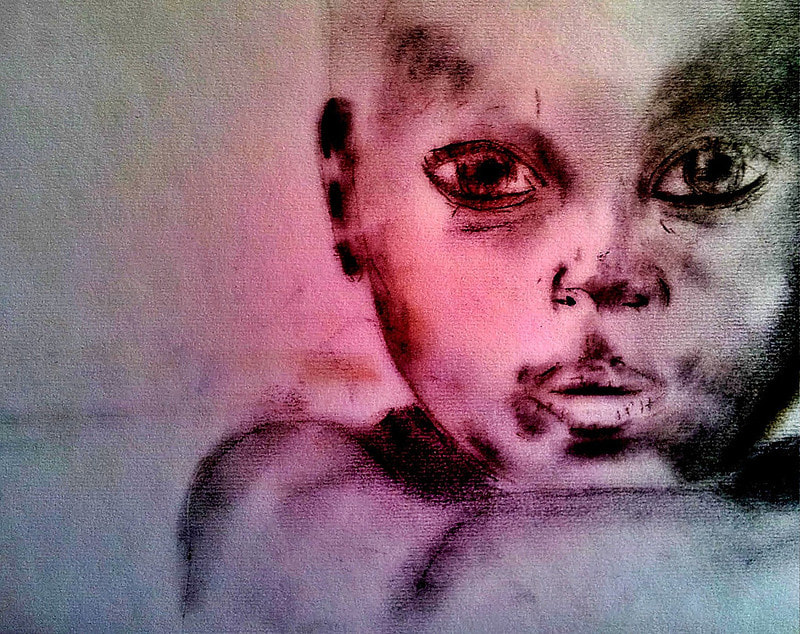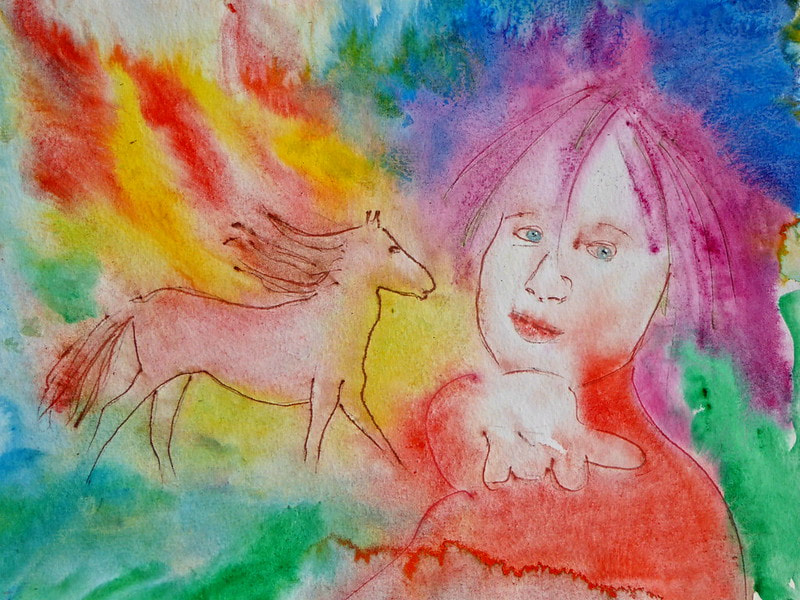How many genders does God have?
maybe more than we can imagine
Jay McDaniel
There is much thinking in the Abraham and Sarah world about alternative ways of thinking about God: God as Light, God as Darkness, God as Friend, God as Lover, God as Energy. However, there is a strong temptation, when seeking to retain images of God as personal but also move beyond images of God the Father, to say that the real thing -- the real God -- is beyond gender altogether or, to say the same thing, God is disembodied. Unfortunately, this way of thinking distances God still further, rendering God into an object of the intellect about whom nothing can be said literally, because God is above it all. It is a continuation of the overly-patriarchal way of thinking, sometimes disguised as apophatic mysticism.
Is God Truly Genderless?
I remember reading a Facebook post some time ago called "Is God Truly Genderless? I'm Not Asking for a Mystical Response." For my part I love mystical responses. Appeals to mystical feelings are, to my mind, more truthful than appeals to dry-as-dust philosophical prose. Still, I admire writer's simple point: Can someone just be clear about how God is or is not Gendered?
Here's a pitch for clarity in the technical terms of process theology:
Is God Truly Genderless?
I remember reading a Facebook post some time ago called "Is God Truly Genderless? I'm Not Asking for a Mystical Response." For my part I love mystical responses. Appeals to mystical feelings are, to my mind, more truthful than appeals to dry-as-dust philosophical prose. Still, I admire writer's simple point: Can someone just be clear about how God is or is not Gendered?
Here's a pitch for clarity in the technical terms of process theology:
Infinite Love is Infinitely Diverse and Inclusive
Some people like to draw a distinction between the infinite God and our biological world. They like to say that God is beyond gender, by which they seem to mean that there is nothing in God that is tainted by such finite realities. But there are multiple kinds of infinity, one of which is infinitely diverse and inclusive love. This is the kind of love that is important to open and relational (process) theologians. To think of God this way naturally invites a recognition that God is poly-gendered in some ways and beyond gender in others.
What is divine diversity? If we think of God as the embodied Mind or Consciousness of the universe, then divine diversity is the multiplicity of the universe itself as part of what makes God God. And what is divine inclusion? Again, if we think of God as the embodied Mind or Consciousness of the universe, then divine inclusion is the way God feels the multiplicity in a loving way. Consider the way in which you feel the influences of your own body: the pleasures and the pains. They are part of who you are even as you are more than them. And so it is with God, say process theologians. Our very lives -- and the lives of all other beings -- are part of who and what God is. Our immanence with God includes our gender-experience. The simple way of putting this is to say "the universe is God's body and there are as many genders in God as there are forms of gender-experience in the universe."
God's Physical Feelings
But let me put the point in more technical terms that you will well understand, to explain what I mean. In panentheism as understood with help from the philosophy of Whitehead, God does not have a single physical body located in a region of space. God is disembodied if "body" means a locatable, biological body. Still, God has bodily experience, so process theologians believe. They -- we -- propose that God has (what Whitehead calls) "physical feelings" of all the events in the world, including the embodied feelings of human beings. These physical feelings on God's part are part of God's own "real internal constitution" (Whitehead's phrase) in "the consequent nature of God" (Whitehead's phrase). We propose further that God responds to what is felt empathically, with emotions (Whitehead calls "subjective forms) that are partly conformal to what is felt. There is (what Whitehead calls) a "vector transmission of energy" such that the energy (or feeling) in the entity at issue becomes part of God's ongoing life.
Given that humans on our small planet are among the entities felt, we rightly ask: What aspects of our lives, what feelings, become part of God's life? Surely those aspects include our gender experience, which for most human beings is not merely a "predication" in a propositional sentence, but a way of living in the world, filled with moods and emotions of its own. Our gender-experience is connected with our own bodily experience, including our sexuality, but it also includes (what Whitehead calls) our intellectual and imaginative experience, how we and others understand ourselves. These three -- the sexual and the intellectual and the imaginative -- are woven together to form our gender-experience. They form our gender identity. Typically this identity is fluid, changing over time, and not necessarily understandable in terms of socially given binaries. If we focus on the abstract "predications" and mistakenly confuse a person with them, we fall into (what Whitehead calls) "the fallacy of misplaced concreteness." But deeper than the predicates, experientially, is the flow of gender experience itself in the person at issue, which is part of (and by no means all of) who and what we are.
A person can be trapped in a particular form of gender experience and a person can consciously develop an alternative form. A person can be frustrated by societal norms or at home with them. But the gender experience is quite real, not just a predicate in a sentence. God feels our feelings physically and as this happens they become part of God. This receptivity, this empathy is not just an accident in God, a contingency, it is an essential feature of God. It is part of what Thomas Jay Oord would call God's kenotic love.
Kenosis is not simply God "giving" love to the world, it is God "receiving" the world in a vulnerable and empathic way, such that the world, including the emotional world of gender experience, becomes part of God's life. Because God's subjective aims are for the well-being of all life, God (so process theologians believe) lures individuals and societies to co-create satisfying, multiple, loving forms of gender-experience and to seek language that helps us name them. But God must feel the experiences first, not unlike the way a nurturing parent must feel the experiences of a child.
I say this as a father of two boys, now men. I know what it is like to love them, to care for them, to hold them. To this day I can remember the last time I got to hold my son Matthew's hand as he crossed the street, before he got too old for me to do that. I can feel the feelings I then felt, including the touch.
If God is infinitely distant, and thus infinitely separated from the universe, God is incapable of such feeling, and not powerful at all -- less powerful than I am. God can only know my feelings from a distance, inferentially, whereas I know them intimately, first-hand. I know things God doesn't now.
However, if God is embodied in the ways described above, God is powerful enough to know and to feel gender-experience; God is infinitely diverse and inclusive in a loving way. I worry that the old-fashioned language of an infinite God who is disembodied, and therefore ungendered, advances an old, somewhat patriarchal way of thinking, despite our own intentions to affirm divine love. I prefer to say that God is poly-gendered: "God contains all genders." And why not also say that God is "beyond" gender. And if God is "beyond" gender in some way, it is not that God is above gender, but that God is infinitely inclusive in ways that far transcend our binaries. If there is any wisdom in this, the need is then to encourage a playful and compassionate freedom in gender-language about God, in service to a world now trapped in patriarchal, monarchical, authoritarian images of God as a distant "lord" who is an absentee landlord. And the need is to recognize, along with process theologians and so many others, that the power of God is relational not manipulative, persuasive not coercive, flexible not rigid, compassionate not authoritarian, polygendered not monogendered. Our task is then to respond to the love of this God, infinitely diverse and inclusive, by helping build communities that are creative, compassionate, participatory, diverse, egalitarian, and ecologically wise -- with no gender left behind.
Some people like to draw a distinction between the infinite God and our biological world. They like to say that God is beyond gender, by which they seem to mean that there is nothing in God that is tainted by such finite realities. But there are multiple kinds of infinity, one of which is infinitely diverse and inclusive love. This is the kind of love that is important to open and relational (process) theologians. To think of God this way naturally invites a recognition that God is poly-gendered in some ways and beyond gender in others.
What is divine diversity? If we think of God as the embodied Mind or Consciousness of the universe, then divine diversity is the multiplicity of the universe itself as part of what makes God God. And what is divine inclusion? Again, if we think of God as the embodied Mind or Consciousness of the universe, then divine inclusion is the way God feels the multiplicity in a loving way. Consider the way in which you feel the influences of your own body: the pleasures and the pains. They are part of who you are even as you are more than them. And so it is with God, say process theologians. Our very lives -- and the lives of all other beings -- are part of who and what God is. Our immanence with God includes our gender-experience. The simple way of putting this is to say "the universe is God's body and there are as many genders in God as there are forms of gender-experience in the universe."
God's Physical Feelings
But let me put the point in more technical terms that you will well understand, to explain what I mean. In panentheism as understood with help from the philosophy of Whitehead, God does not have a single physical body located in a region of space. God is disembodied if "body" means a locatable, biological body. Still, God has bodily experience, so process theologians believe. They -- we -- propose that God has (what Whitehead calls) "physical feelings" of all the events in the world, including the embodied feelings of human beings. These physical feelings on God's part are part of God's own "real internal constitution" (Whitehead's phrase) in "the consequent nature of God" (Whitehead's phrase). We propose further that God responds to what is felt empathically, with emotions (Whitehead calls "subjective forms) that are partly conformal to what is felt. There is (what Whitehead calls) a "vector transmission of energy" such that the energy (or feeling) in the entity at issue becomes part of God's ongoing life.
Given that humans on our small planet are among the entities felt, we rightly ask: What aspects of our lives, what feelings, become part of God's life? Surely those aspects include our gender experience, which for most human beings is not merely a "predication" in a propositional sentence, but a way of living in the world, filled with moods and emotions of its own. Our gender-experience is connected with our own bodily experience, including our sexuality, but it also includes (what Whitehead calls) our intellectual and imaginative experience, how we and others understand ourselves. These three -- the sexual and the intellectual and the imaginative -- are woven together to form our gender-experience. They form our gender identity. Typically this identity is fluid, changing over time, and not necessarily understandable in terms of socially given binaries. If we focus on the abstract "predications" and mistakenly confuse a person with them, we fall into (what Whitehead calls) "the fallacy of misplaced concreteness." But deeper than the predicates, experientially, is the flow of gender experience itself in the person at issue, which is part of (and by no means all of) who and what we are.
A person can be trapped in a particular form of gender experience and a person can consciously develop an alternative form. A person can be frustrated by societal norms or at home with them. But the gender experience is quite real, not just a predicate in a sentence. God feels our feelings physically and as this happens they become part of God. This receptivity, this empathy is not just an accident in God, a contingency, it is an essential feature of God. It is part of what Thomas Jay Oord would call God's kenotic love.
Kenosis is not simply God "giving" love to the world, it is God "receiving" the world in a vulnerable and empathic way, such that the world, including the emotional world of gender experience, becomes part of God's life. Because God's subjective aims are for the well-being of all life, God (so process theologians believe) lures individuals and societies to co-create satisfying, multiple, loving forms of gender-experience and to seek language that helps us name them. But God must feel the experiences first, not unlike the way a nurturing parent must feel the experiences of a child.
I say this as a father of two boys, now men. I know what it is like to love them, to care for them, to hold them. To this day I can remember the last time I got to hold my son Matthew's hand as he crossed the street, before he got too old for me to do that. I can feel the feelings I then felt, including the touch.
If God is infinitely distant, and thus infinitely separated from the universe, God is incapable of such feeling, and not powerful at all -- less powerful than I am. God can only know my feelings from a distance, inferentially, whereas I know them intimately, first-hand. I know things God doesn't now.
However, if God is embodied in the ways described above, God is powerful enough to know and to feel gender-experience; God is infinitely diverse and inclusive in a loving way. I worry that the old-fashioned language of an infinite God who is disembodied, and therefore ungendered, advances an old, somewhat patriarchal way of thinking, despite our own intentions to affirm divine love. I prefer to say that God is poly-gendered: "God contains all genders." And why not also say that God is "beyond" gender. And if God is "beyond" gender in some way, it is not that God is above gender, but that God is infinitely inclusive in ways that far transcend our binaries. If there is any wisdom in this, the need is then to encourage a playful and compassionate freedom in gender-language about God, in service to a world now trapped in patriarchal, monarchical, authoritarian images of God as a distant "lord" who is an absentee landlord. And the need is to recognize, along with process theologians and so many others, that the power of God is relational not manipulative, persuasive not coercive, flexible not rigid, compassionate not authoritarian, polygendered not monogendered. Our task is then to respond to the love of this God, infinitely diverse and inclusive, by helping build communities that are creative, compassionate, participatory, diverse, egalitarian, and ecologically wise -- with no gender left behind.


